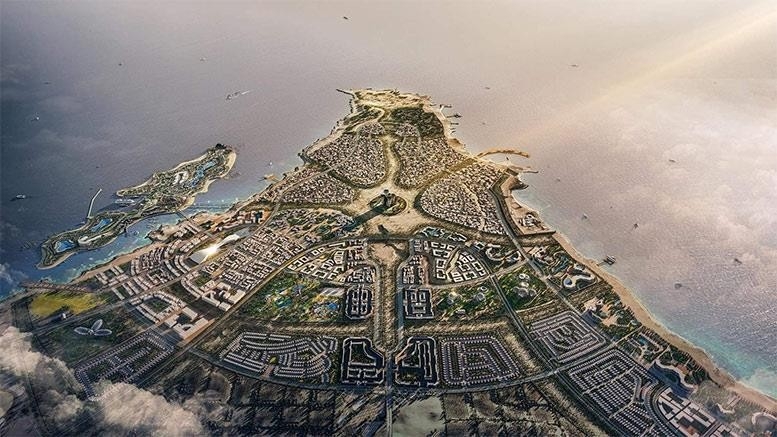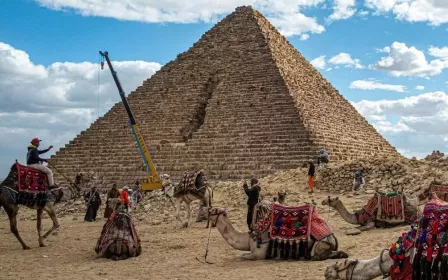Egypt announces $35bn deal with UAE to buy premium Mediterranean area

Egypt has agreed to a $35bn deal with the United Arab Emirates to develop the area of Ras el-Hekma on its northwestern coast, Egyptian Prime Minister Mostafa Madbouly announced on Friday after weeks of speculations.
Madbouly said at a news conference, which was attended by Egyptian and Emirati officials, that Egypt will receive an advance amount of $15bn in the coming week, and another $20bn within two months.
The deal is the largest foreign direct investment in an urban development project in the country's modern history, the prime minister said. It is a partnership between the Egyptian government and an Emirati consortium led by ADQ, he said.
News about the sale has triggered condemnation by critics of the government, who said the land is one of Egypt's most valuable coastal locations and that it should be developed by local investors.
But Madbouly said that the Egyptian state will have a 35 percent share of the profits from this project, although it is a private investment with the majority of shares held by the UAE consortium.
Stay informed with MEE's newsletters
Sign up to get the latest alerts, insights and analysis, starting with Turkey Unpacked
He said that the area of the Ras el-Hekma project is 170 million square metres, and will include residential neighbourhoods, tourist resorts, schools, universities, an industrial zone, a central financial and business district, an international marina for tourist yachts, and an international airport south of the city.
'If things go as announced, this event should strengthen the hand of the Egyptian authorities in negotiations with the IMF'
- Khaled Ikram, economist
Madbouly said that the deal will include $11bn already deposited by the UAE in the Central Bank, an amount that will be converted into a grant. He added that the project will alleviate the country's economic crisis.
Concerning the fate of the current inhabitants of the Ras el-Hekma area, Madbouly said they would be relocated to other areas and would be provided financial compensation, as residents have reportedly expressed fears of forced evictions.
Commenting on the deal, Egyptian business tycoon Naguib Sawiris said it will contribute to resolving the current economic crisis by "attracting foreign currency, creating jobs and stabilising the exchange rate."
Following the announcement of the deal, the price of the US dollar in parallel markets dropped by 5 Egyptian pounds, reaching 57, compared to 62 on Thursday, according to the state-linked Cairo24 website.
Egypt is currently in talks with the International Monetary Fund for a bailout deal that is expected to exceed $10bn. It is expected to be followed by currency devaluation to match black market rates - nearly double the official rate of 31 Egyptian pounds to the US dollar.
Reassuring creditors
Madbouly on Friday said that Cairo is now "very, very few steps away" from reaching a deal with the IMF, following the Ras el-Hekma investments.
Khaled Ikram, an economist and former director of the World Bank Egypt department, said the deal should enhance Egypt’s position in talks with the IMF.
“If things go as announced, this event should strengthen the hand of the Egyptian authorities in negotiations with the IMF,” he told Middle East Eye.
He added that the deal should “ease up on fears of Egypt's defaulting on its external obligations” as well as “reassure creditors and investors that they should stop speaking of waning support for Egypt's economy from the Gulf countries.”
Egypt, home to more than 109 million people, is grappling with a severe economic crisis, with record inflation and foreign currency shortages.
In August, annual inflation in Egypt reached close to 40 percent, according to official figures, plunging many Egyptians near or under the poverty line.
More than half the population had already been below or close to the poverty line before the current crisis.
Foreign debt has quadrupled, reaching $164bn, over President Abdel Fattah el-Sisi's almost 10-year presidency. Debt servicing is currently consuming most of the state's annual expenditures. Egypt is due to pay $34.8 billion in external debt servicing in 2024 alone, according to a report by the Central Bank.
Egypt's total foreign currency reserves are $35bn. According to the Egyptian Central Bank, the ratio of short-term debts to foreign currency reserves in 2022 passed 80 percent, double that of 2021.
Middle East Eye delivers independent and unrivalled coverage and analysis of the Middle East, North Africa and beyond. To learn more about republishing this content and the associated fees, please fill out this form. More about MEE can be found here.





